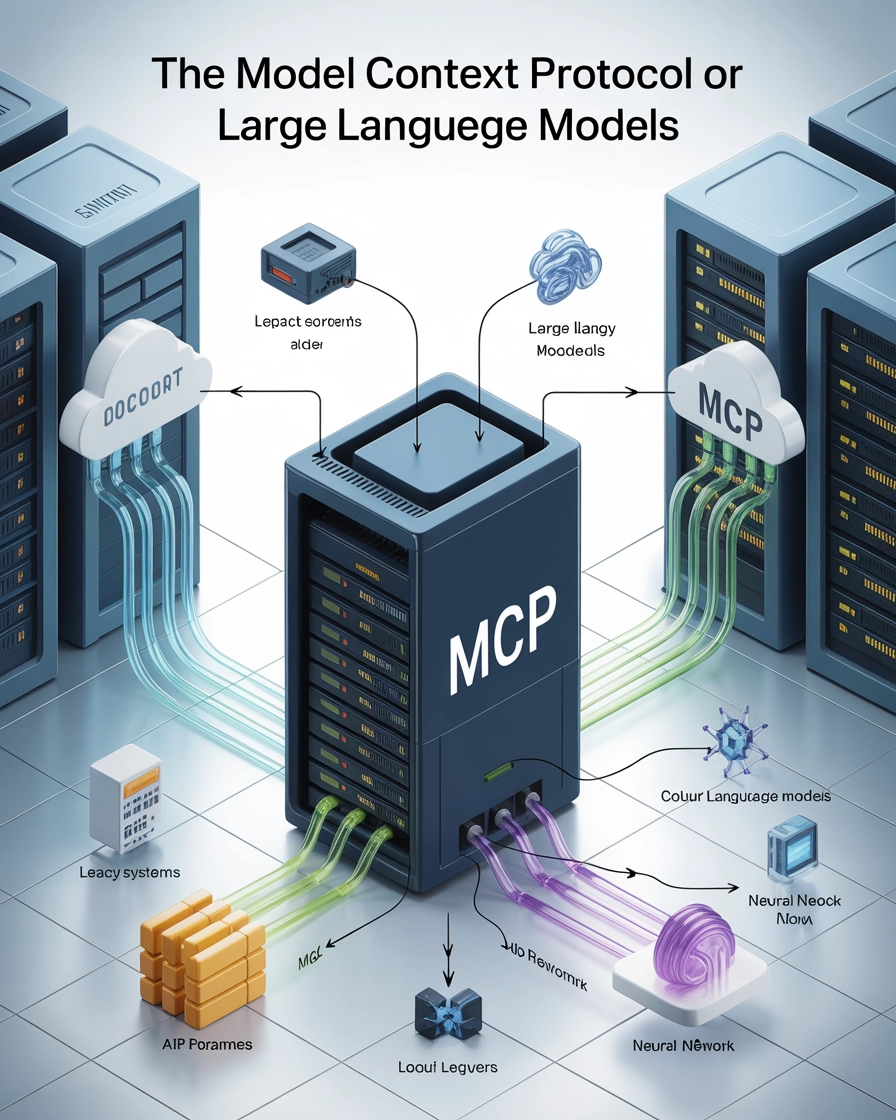
Model Context Protocol (MCP) Server
The Model Context Protocol (MCP) Server bridges AI assistants with external data sources, APIs, and services, enabling streamlined integration of complex workfl...
Remote MCP (Model Context Protocol) is a system that allows AI agents to access external tools, data sources, and services through standardized interfaces hosted on remote servers. This enables AI models to interact with specialized functions and information beyond their training data, expanding their capabilities while maintaining security and flexibility.
A remote MCP server exposes data, tools, and automation capabilities to AI agents, especially large language models (LLMs) and agentic systems, over a standardized protocol. Unlike local servers, remote MCP servers are hosted in the cloud or on the internet, accessible by any authorized AI client or workflow. They act as a universal “adapter” for connecting AI agents to external APIs, SaaS platforms, developer tools, and enterprise data.
Model Context Protocol (MCP) is an open protocol that standardizes how LLMs and agentic applications interact with external tools and data. It establishes a universal contract for tool/resource discovery, capability description, tool invocation, and context exchange between AI clients and servers.
| Feature | Local MCP Server | Remote MCP Server |
|---|---|---|
| Location | User’s machine | Cloud/Internet-hosted |
| Comm. | stdio, local socket | HTTP/SSE/Streamable HTTP |
| Setup | Manual, user-managed | OAuth login, provider-managed |
| Security | User-managed secrets/keys | OAuth 2.1, provider-enforced |
| Use Case | Private, local dev, sensitive | SaaS, multi-user, web agents |
| Scaling | Limited to user hardware | Cloud-scale, multi-tenant |
Architecture diagram:
+---------------------+ HTTP/SSE +---------------------+
| AI Agent (Client) | <----------------> | Remote MCP Server |
+---------------------+ +---------------------+
| |
OAuth (AuthN/AuthZ) External Service/API
| |
User grants access (e.g. Jira API, DB)
| Feature | Local MCP Server | Remote MCP Server |
|---|---|---|
| Setup | Manual, local | OAuth web login, provider-managed |
| Communication | stdio, local socket | HTTP/SSE, Streamable HTTP |
| Security | User secrets/keys | OAuth 2.1, short-lived tokens |
| Updates | User responsibility | Provider-managed, auto-patched |
| Scalability | Limited to one machine | Horizontally scalable, multi-user |
| Use Case | Private dev, custom tools | SaaS, web agents, enterprise access |
Example: Atlassian’s Remote MCP server connects Jira and Confluence to Claude or other LLMs. The agent can:
Example: A marketing agent integrates three different MCP servers:
Agent chains calls across all servers in one workflow (“Summarize yesterday’s blog performance and suggest improvements”).
Example: A remote MCP server exposes an SEO audit API. An AI agent can:
Example: DevOps team exposes CI/CD status, issue tracker, and deployment controls via an internal MCP server. AI agents can:
| Advantage | Limitation / Trade-off |
|---|---|
| Easy scaling | Requires reliable internet |
| No local setup | Higher latency than local |
| Centralized | Dependence on provider uptime |
| OAuth security | Complexity in scope management |
| Multi-client | Data in transit (encrypted) |
Remote MCP servers use OAuth 2.1 for secure, delegated authentication/authorization:
Best practices:
Remote MCP (Model Context Protocol) is a system that allows AI agents to access tools, data sources, and services hosted on external servers through standardized interfaces, extending the capabilities of AI models beyond their built-in functions.
Unlike local integrations that are built directly into an AI platform, Remote MCP provides access to tools and data hosted on external servers, offering greater flexibility, scalability, and the ability to connect to specialized or proprietary systems without revealing sensitive implementation details.
Remote MCP offers enhanced extensibility, security through isolation, specialized functionality, real-time data access, reduced latency for complex operations, simplified maintenance, and the ability to leverage third-party expertise while maintaining control over sensitive data.
Remote MCP can access a wide range of services including database systems, ERP platforms like Odoo, CRM tools, document management systems, specialized APIs, analytics engines, IoT device networks, and custom business logic implemented as microservices.
Remote MCP implements multiple security measures including authentication, authorization, data encryption, request validation, rate limiting, and audit logging. It isolates AI models from direct access to backend systems and can be configured with granular permissions to control access to sensitive operations.
Create your own MCP Servers or connect to Remote MCPs to extend your AI agents' capabilities with any integration.

The Model Context Protocol (MCP) Server bridges AI assistants with external data sources, APIs, and services, enabling streamlined integration of complex workfl...

The ModelContextProtocol (MCP) Server acts as a bridge between AI agents and external data sources, APIs, and services, enabling FlowHunt users to build context...

Agentic AI is redefining workflow automation with the Model Context Protocol (MCP), enabling scalable, dynamic integration of AI agents with diverse resources. ...
Cookie Consent
We use cookies to enhance your browsing experience and analyze our traffic. See our privacy policy.